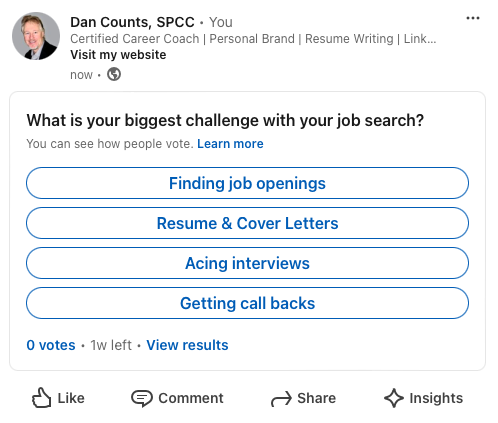Exploring a successful job search strategies to elevate your professional presence.
Update your LinkedIn Profile
Your LinkedIn Profile is your first impression with potential hiring managers and members of your professional network.
Make it stand out:
Highlight Transferable Skills: Identify skills from your previous roles that are relevant to your new career.
Use a Professional Summary: Start with a strong professional summary that highlights your career goals and key qualifications. This helps viewers to quickly understand your fit for the role.
Quantify Achievements: Use numbers to demonstrate your accomplishments.
Keep It Concise: Don’t use 10 words when you can describe it in three.
Networking
Building and leveraging your professional network is crucial during a career transition. In fact, maintaining a network is crucial to your career development.
Here’s how to do it effectively:
Leverage LinkedIn: Connect with industry professionals, join relevant groups, and engage with content in your desired field.
Attend Industry Events: Participate in webinars, workshops, and conferences related to your new career. These events are great opportunities to meet industry professionals and learn about the latest trends.
Set up 20 Minute Networking Meetings: Reach out to individuals working in your target industry and request a time to chat. These conversations can provide valuable insights and help you build connections.
Join Professional Associations: Become a member of professional associations related to your new career. Get involved. Find out how you can contribute to the organization.
Stay in Touch: Regularly update your network on your career transition progress. Share relevant articles, celebrate milestones, and express gratitude for any assistance you receive.
Developing New Skills
Acquiring new skills is often necessary for a successful career transition.
Identify Skill Gaps: Research job descriptions in your desired field to identify the skills required. Perhaps conduct a SWOT analysis to identify skill gaps
Online Courses and Certifications: Enroll in online courses and certification programs that offer training in your target skills. Platforms like Coursera, Udemy, and LinkedIn Learning provide a wide range of options.
Mentorship: Find a mentor in your desired industry who can provide guidance, advice, and support as you develop new skills and navigate your career transition.
Continuous Learning: Stay updated with industry trends and continue learning even after securing a new job. This will help you stay competitive while advancing your career.
Hire a Career Coach
An experienced career coach can significantly impact your career transition by helping you stay on the path of least resistance, targeting positions that are the right match for you.
Identify Your Marketable Skills with a Career SWOT Analysis: Understanding your strengths, weaknesses, opportunities, and threats (SWOT) is crucial in career transition. This analysis will help you showcase your marketability and readiness for the job you desire.
Develop a Go-To-Market Strategy: Learn how to get noticed for your ideal job through an effective, results-driven strategy. A coach can guide you in creating a plan that highlights your unique value proposition and targets the right employers.
Master Effective Job Search Strategies: Discover how to unlock the hidden job market and get insider tips on bypassing Applicant Tracking Systems (ATS).
Mock Sessions: Enhance your interview skills with mock interview preparation. Refine your elevator pitch and craft probing questions to ask during the interview, transforming it into an engaging exchange of information rather than a one-sided interrogation.
Offer Negotiation Assistance: Ensure you get the compensation you deserve. Learn effective negotiation tactics to maximize your job offer.
Gain an Accountability Partner and Career Guide: Stay on track with an accountability partner and career guide. A coach provides support and guidance to help you stay focused and motivated throughout your job search journey.
Final Thoughts
Transitioning to a new career is a significant step, but with the right strategies in place, you can make it a smooth and successful journey. Focus on crafting a standout LinkedIn profile, building a robust professional network, and developing the necessary skills to thrive in your new role.
Remember, every step you take brings you closer to your career goals. Keep pushing forward, stay positive, and don’t hesitate to reach out for support when needed. Your dream career is within reach!
On The Street:
The IT job market in July 2024 is characterized by a mix of layoffs and hiring, creating a competitive landscape for job seekers:
• Despite high-profile layoffs in the tech sector, with over 70,000 workers laid off in the first quarter of 2024 (according to layoffs.fyi), the overall demand for IT professionals remains strong.
• The unemployment rate in the tech sector is relatively low, under 3% on average in 2024.
• According to an article by Per Scholas a ZipRecruiter survey, found many laid-off tech workers are finding new positions, with approximately 74% of laid-off tech workers securing new jobs in the tech industry. Though the time required to land a new job remains elevated.


